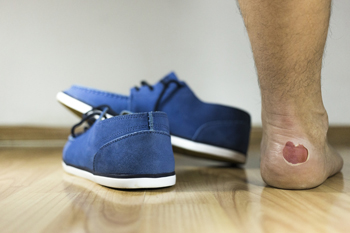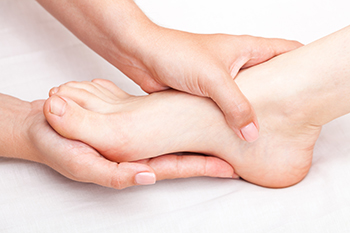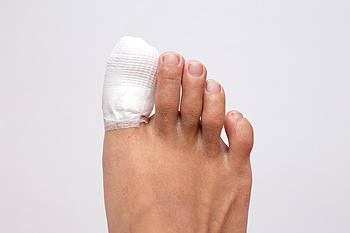
Foot blisters are a frequent and often painful condition caused by friction, moisture, and heat. They occur when the skin is repeatedly rubbed, typically due to wearing ill-fitting shoes or prolonged walking and running. This constant rubbing causes the layers of skin to separate, allowing fluid to collect in the gap. Moisture from sweat or wet environments softens the skin, making it more vulnerable to damage. Heat generated during activity can also contribute to blister formation. Wearing new shoes, especially those not broken in, or going sockless can increase the risk. Additionally, certain skin conditions or allergies may make some individuals more susceptible. If you have developed a foot blister that is bothersome or has become infected, it is suggested that you contact a podiatrist who can offer safe and effective treatment along with prevention tips.
Blisters are prone to making everyday activities extremely uncomfortable. If your feet are hurting, contact Dr. Scott Shrem of Garden State Foot & Ankle Center. Our doctor can provide the care you need to keep you pain-free and on your feet.
Foot Blisters
Foot blisters develop as a result of constantly wearing tight or ill-fitting footwear. This happens due to the constant rubbing from the shoe, which can often lead to pain.
What Are Foot Blisters?
A foot blister is a small fluid-filled pocket that forms on the upper-most layer of the skin. Blisters are filled with clear fluid and can lead to blood drainage or pus if the area becomes infected.
How Do Blisters Form?
Blisters on the feet are often the result of constant friction of skin and material, usually by shoe rubbing. Walking in sandals, boots, or shoes that don’t fit properly for long periods of time can result in a blister. Having consistent foot moisture and humidity can easily lead to blister formation.
Prevention & Treatment
It is important to properly care for the affected area in order to prevent infection and ease the pain. Do not lance the blister and use a Band-Aid to provide pain relief. Also, be sure to keep your feet dry and wear proper fitting shoes. If you see blood or pus in a blister, seek assistance from a podiatrist.
If you have any questions, please feel free to contact our office located in Hazlet, NJ . We offer the newest diagnostic and treatment technologies for all your foot care needs.

The feet can offer important clues about thyroid health, often showing symptoms that are easy to overlook. Cracked heels may be one of the earliest signs, especially when dryness persists despite moisturizing. Itchy feet can also occur due to slowed skin cell turnover, commonly seen with low thyroid function. Cold feet are another frequent symptom, as the thyroid helps regulate body temperature and poor circulation may result from an underactive thyroid. Additionally, swollen feet can develop due to fluid retention, which sometimes accompanies hormonal imbalances linked to thyroid conditions. These foot-related signs should not be ignored, especially when they appear together or persist. If you have any of the above foot symptoms, it is suggested that you consult a podiatrist who can treat various foot conditions, and discuss the connection regarding possible thyroid disease.
When dealing with systemic disease of the feet, it is extremely important to check the affected areas routinely so that any additional problems are caught quickly. If you have any concerns about your feet and ankles contact Dr. Scott Shrem from Garden State Foot & Ankle Center. Our doctor will assist you with all of your podiatric needs.
Systemic Diseases of the Feet
Systemic diseases affect the whole body, and symptoms usually are displayed in the feet. This condition can make a patient’s ability to walk unbearable. Systemic diseases include gout, diabetes mellitus, neurological disorders, and arthritis.
Gout – is caused by an excess of uric acid in the body. Common symptoms include pain, inflammation, and redness at the metatarsal/phalangeal joint of the base big toe. Gout can be treated by NSAIDs to relieve pain and inflammation, and other drugs that lower the acid levels in the body.
Diabetes mellitus – is an increase in the level of blood sugar that the body cannot counteract with its own insulin. Failure to produce enough insulin is a factor in Diabetes.
Diabetes of the Feet
Diabetic Neuropathy – may lead to damaged nerves and affect the feet through numbness and loss of sensation.
Peripheral Vascular Disease – can restrict the blood flow to the feet, and often times lead to amputation of the feet.
If you have any questions please feel free to contact our office located in Hazlet, NJ . We offer the newest diagnostic and treatment technologies for all your foot and ankle needs.

A broken toe might seem minor, but it can be surprisingly painful and disruptive. Toe fractures happen from direct impact, like stubbing a toe on furniture, dropping something heavy on it, or even excessive stress from repetitive movements. There are different types of toe fractures. A stress fracture develops over time from repeated strain, common in runners and athletes. A non-displaced fracture means the bone has cracked but remains aligned, while a displaced fracture occurs when the bone shifts out of place. A comminuted fracture involves multiple breaks in the same bone, and an open fracture means the bone has pierced the skin, requiring immediate medical attention. Treatment depends on severity, ranging from taping the injured toe to its neighbor for stability to wearing a stiff-soled shoe. Severe cases may require a splint or even surgery to ensure proper healing. If you have severe pain from a broken toe, it is strongly suggested that you schedule an appointment with a podiatrist for appropriate treatment.
A broken toe can be very painful and lead to complications if not properly fixed. If you have any concerns about your feet, contact Dr. Scott Shrem from Garden State Foot & Ankle Center. Our doctor will treat your foot and ankle needs.
What to Know About a Broken Toe
Although most people try to avoid foot trauma such as banging, stubbing, or dropping heavy objects on their feet, the unfortunate fact is that it is a common occurrence. Given the fact that toes are positioned in front of the feet, they typically sustain the brunt of such trauma. When trauma occurs to a toe, the result can be a painful break (fracture).
Symptoms of a Broken Toe
- Throbbing pain
- Swelling
- Bruising on the skin and toenail
- The inability to move the toe
- Toe appears crooked or disfigured
- Tingling or numbness in the toe
Generally, it is best to stay off of the injured toe with the affected foot elevated.
Severe toe fractures may be treated with a splint, cast, and in some cases, minor surgery. Due to its position and the pressure it endures with daily activity, future complications can occur if the big toe is not properly treated.
If you have any questions please feel free to contact our office located in Hazlet, NJ . We offer the newest diagnostic and treatment technologies for all your foot and ankle needs.
Blog Archives
- April 2025
- March 2025
- February 2025
- January 2025
- December 2024
- November 2024
- October 2024
- September 2024
- August 2024
- July 2024
- June 2024
- May 2024
- April 2024
- March 2024
- February 2024
- January 2024
- December 2023
- November 2023
- October 2023
- September 2023
- August 2023
- July 2023
- June 2023
- May 2023
- April 2023
- March 2023
- February 2023
- January 2023
- December 2022
- November 2022
- October 2022
- September 2022
- August 2022
- July 2022
- June 2022
- May 2022
- April 2022
- March 2022
- February 2022
- January 2022
- December 2021
- November 2021
- October 2021
- September 2021
- August 2021
- July 2021
- June 2021
- May 2021
- April 2021
- March 2021
- February 2021
- January 2021
- December 2020
- November 2020
- October 2020
- September 2020
- August 2020
- July 2020
- June 2020
- May 2020
- April 2020
- March 2020
- February 2020
- January 2020
- December 2019
- November 2019
- October 2019
- September 2019
- August 2019
- July 2019
- June 2019
- May 2019
- April 2019
- March 2019
- February 2019
- January 2019
- December 2018
- November 2018
- October 2018
- September 2018
- August 2018
- July 2018
- June 2018
- May 2018
- April 2018
- March 2018









